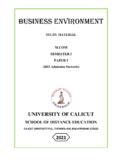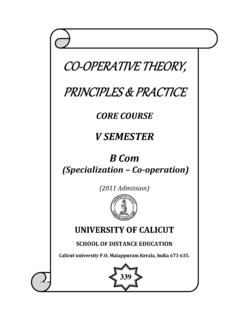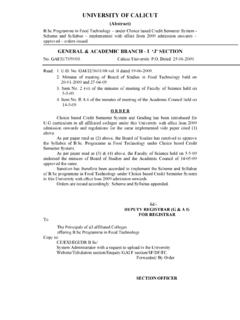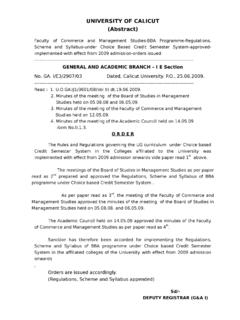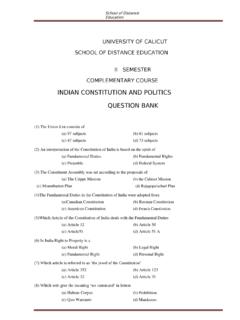Transcription of BASICS OF BANKING AND INSURANCE - University of …
1 BASICS OF BANKING AND. INSURANCE . V SEMESTER. CORE COURSE. B Com (2011 Admission). University OF CALICUT. SCHOOL OF DISTANCE EDUCATION. Calicut University , Malappuram Kerala, India 673 635. 334. School of Distance Education University OF CALICUT. SCHOOL OF DISTANCE EDUCATION. STUDY MATERIAL. Core Course B Com V Semester BASICS OF BANKING AND INSURANCE . Prepared by Sri. Praveen M V, Asst. Professor, Department of Commerce, Govt. College, Madappally. Scrutinized by Dr. K. Venugopalan, Associate Professor, Department of Commerce, Govt. College, Madappally. Layout: Computer Section, SDE.. Reserved BASICS of BANKING and INSURANCE Page 2.
2 School of Distance Education CONTENTS PAGE. MODULE 1 ORIGIN AND DEVELOPMENT OF BANKING 5. MODULE 2 TYPES OF CUSTOMERS OF BANKS 38. MODULE 3 INTRODUCTION TO INSURANCE 49. MODULE 4 INSURANCE LAWS IN INDIA 78. BASICS of BANKING and INSURANCE Page 3. School of Distance Education BASICS of BANKING and INSURANCE Page 4. School of Distance Education MODULE 1. ORIGIN AND DEVELOPMENT OF BANKING . BANKING : Meaning and definition Finance is the life blood of trade, commerce and industry. Now-a-days, BANKING sector acts as the backbone of modern business. Development of any country mainly depends upon the BANKING system. A bank is a financial institution which deals with deposits and advances and other related services.
3 It receives money from those who want to save in the form of deposits and it lends money to those who need it. It deals with deposits and advances and other related services like lending money to grow the economy. Banks act as bridge between the people who save and people who want to borrow , It receives money from those people who want to save as deposits and it lends money to those who want to borrow it. The money you deposited in bank will not be idle. It will grow by means of interest to your bank account they will earn interest in return for lending out the same money to borrowers. This would ensure smooth money flow to develop our economy.
4 Definition of a Bank Chamber's Twentieth century Dictionary defines a bank as, an institution for the keeping, lending and exchanging etc. of money . According to BANKING Regulation Act, BANKING means the accepting for the purpose of lending or investment of deposits of money from the public, repayable on demand or otherwise and withdrawable by cheque, draft, and an order or otherwise . Oxford Dictionary defines a bank as "an establishment for custody of money, which it pays out on customer's order.". Prof. Kent defines a bank as, an organization whose principal operations are concerned with the accumulation of the temporarily idle money of the general public for the purpose of advancing to others for expenditure.
5 Evolution of BANKING The term bank is either derived from Old Italian word banca or from a French word banque both mean a Bench or money exchange table. In olden days, European money lenders or money changers used to display (show) coins of different countries in big heaps (quantity) on benches or tables for the purpose of lending or exchanging. According to some authorities, the work Bank itself is derived from the words bancus or banqee, that is, a bench. The early bankers, the Jews in Lombardy, transacted their business on benches in the market place. There are others, who are of the opinion that the word bank is originally BASICS of BANKING and INSURANCE Page 5.
6 School of Distance Education derived from the German word back meaning a joint stock fund, which was Italianized into banco when the Germans were masters of a great part of Italy. This appears to be more possible. But whatever is the origin of the word bank', It would trace the history of BANKING in Europe from the Middle Ages.. Early history of BANKING As early as 2000 , the Babylonians had developed a BANKING system. There is evidence to show that the temples of Babylon were used as banks and such great temples as those of Ephesus and of Delbhi were the most powerful of the Greek BANKING institutions. But the spread of irreligion soon destroyed the public sense of security in depositing money and valuables in temples, and the priests were no longer acting as financial agents.
7 The Romans did not organize State Banks as did the Greeks, but their minute regulations, as to the conduct of private BANKING , were calculated to create the utmost confidence in it. With the end of the civilization of antiquity, and as a result of administrative decentralization and demoralization of the Government authority, with its inevitable counterpart of commercial insecurity, BANKING degenerated for a period of some centuries into a system of financial make shifts. But that was not the only cause. Old prejudices die hard, and Aristotle's dictum, that the charging of interest was unnatural and consequently immoral was adhered to fanatically.
8 Even now some Mohammedans, in obedience to the commands contained in that behalf in their religious books, refuse to accept interest on money loans. The followers of Aristotle's dictum forgot that the ancient world, the Hebres included, although it had to system of banks that would be considered adequate from the modern point of view, and maintained moneylenders and made no sin of interest, but only of usury. However, upon the revival of civilization, growing necessity forced the issue in the middle of the 12 th century, and banks were established at Venice and Genoa, though in fact they did not become banks as we understood them today, till long after.
9 Again the origin of modern BANKING may be traced to the money dealers in Florence, who received money on deposit, and were lenders of money in the 14th century, and the names of the Bardi, Acciajuoli, Peruzzi, Pitti and Medici soon became famous throughout Europe, as bankers. At one time, Florence is said to have had eighty bankers, though it could boast of no public bank. Some experts briefed the history of modern BANKING as: The first public BANKING institution was The Bank of Venice, founded in 1157. The Bank of Barcelona and the bank of Genoa were established in 1401 and 1407 respectively. These are the recognized forerunners of modern commercial banks.
10 Exchange BANKING was developed after the installation of the Bank of Amsterdam in 1609 and Bank of Hamburg in 1690. The credit for laying the foundation of modern BANKING in England goes to the Lombard's of Italy who had migrated to other European countries and England. The bankers of Lombardy developed the money lending business in England. The Bank of England was established in 1694. The development of joint stock commercial BANKING started functioning in 1833. The modern BANKING system actually developed only in the nineteenth century. BASICS of BANKING and INSURANCE Page 6. School of Distance Education Growth and developments of banks in India We cannot have a healthy economy without a sound and effective BANKING system.


